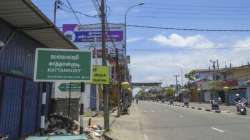Sri Lanka economic emergency: What caused the crisis - explained
Sri Lankan economic crisis: According to Central Bank of Sri Lanka, country's foreign reserves fell to USD 2.8 billion at the end of July, from USD 7.5 billion in November 2019 when the government took office and the rupee has lost more than 20 per cent of its value against the US dollar in that time.

Sri Lankan economic crisis: Sri Lankan President Gotabaya Rajapaksa declared an 'economic crisis' on September 1 amid an unprecedented inflation and plummeting currency and forex reserves. But what caused the sudden economic crisis in the island nation?
What is happening in Sri Lanka?
Sri Lanka, famous for its scenic coastline and mountains, depends heavily on the tourism sector. According to an estimate, 10 per cent of country's Gross Domestic Product (GDP) is linked with the tourism industry.
However, the COVID-19 pandemic has hit tourism hard across the world and Sri Lanka has also been dented. Sri Lanka, a net importer of food and other commodities, is witnessing a surge in Covid cases and deaths which has hit tourism, one of its main foreign currency earners.
According to Central Bank of Sri Lanka, country's foreign reserves fell to USD 2.8 billion at the end of July, from USD 7.5 billion in November 2019 when the government took office and the rupee has lost more than 20 per cent of its value against the US dollar in that time.
President Gotabaya Rajapaksa's organic farming decision
Earlier this year, President Rajapaksa had announced that he aims to make Sri Lanka the first country in the world where the agriculture is 100 per cent organic. The government banned used of chemicals and fertilizers in agriculture which has affected the crop produce to a great extent. Sri Lanka, which is one of the top producers of tea and spices in the world, is staring at a drastic drop in the yield in the coming days.
Steep rise in prices of daily essentials
Meanwhile, the Lankan government has appointed a former army general as commissioner of essential services, who will have the power to seize food stocks held by traders and retailers and regulate their prices.
The military will oversee the action which gives power to officials to ensure that essential items, including rice and sugar, are sold at government-guaranteed prices or prices based on import costs at customs and prevent hiding of stocks, presidential spokesman Kingsley Ratnayake told reporters.
The emergency move followed sharp price rises for sugar, rice, onions and potatoes, while long queues have formed outside stores because of shortages of milk powder, kerosene oil and cooking gas.
(With inputs from agencies)
ALSO READ: COVID-19: Sri Lanka extends lockdown till September 6 as deaths rise
ALSO READ: India's economic activity picking pace, further upside to growth likely: Moody's